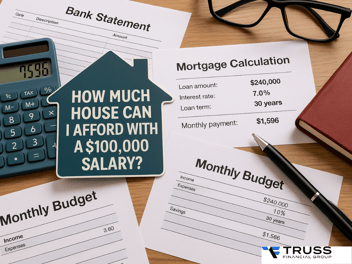14 min read

When exploring home financing, FHA and VA loans often stand out for their flexible terms and government-backed security.
While both make homeownership more accessible, they cater to different types of borrowers.
FHA loans are ideal for first-time buyers or those with lower credit scores, offering down payments as low as 3.5% and more lenient qualification standards.
However, they come with mortgage insurance premiums (MIP) that add to long-term costs.
VA loans, available exclusively to veterans, active-duty service members, and eligible spouses, offer some of the best terms in lending no down payment, no mortgage insurance, and competitive interest rates.
Instead of MIP, borrowers may pay a one-time VA funding fee, which can be rolled into the loan.
At a glance:
-
FHA: 3.5% down, open to all buyers, requires MIP.
-
VA: 0% down, military-exclusive, no MIP, may include a funding fee.
-
FHA loan limits vary by county; VA loans have no limits for borrowers with full entitlement.
Best for:
-
Choose FHA if you’re a civilian buyer with limited savings or imperfect credit.
-
Choose VA if you’re a qualified veteran seeking zero down and long-term savings.
Both options can open the door to homeownership and Truss Financial Group can help you compare, qualify, and close with confidence.
If you’re a homebuyer exploring your financing options, you’ve probably come across FHA Loans and VA loans. Both are government-backed mortgages with unique benefits. But how do you know which one is the right fit for you?
FHA loans are a popular choice for first-time homebuyers or those with lower credit scores who need a low down payment option. VA loans, on the other hand, offer incredible benefits like no down payment and no mortgage insurance.
By the end of this guide, you’ll understand the key differences between FHA and VA loans, their pros and cons, and how to decide which option best fits your needs.

____________________________________________________________________________
Key Takeaways
![]() FHA loans are open to all borrowers and require a minimum 3.5% down payment, while VA loans are exclusive to military members and require no down payment.
FHA loans are open to all borrowers and require a minimum 3.5% down payment, while VA loans are exclusive to military members and require no down payment.
![]() FHA loans require upfront and annual mortgage insurance premiums (MIP), while VA loans have no mortgage insurance but may include a VA funding fee.
FHA loans require upfront and annual mortgage insurance premiums (MIP), while VA loans have no mortgage insurance but may include a VA funding fee.
![]() FHA loans allow lower credit scores (as low as 500 with a 10% down payment), while VA loans don’t have a minimum credit score, though lenders typically look for 620 or higher.
FHA loans allow lower credit scores (as low as 500 with a 10% down payment), while VA loans don’t have a minimum credit score, though lenders typically look for 620 or higher.
![]() FHA loans have loan limits set by the county, whereas VA loans have no loan limits for borrowers with full entitlement.
FHA loans have loan limits set by the county, whereas VA loans have no loan limits for borrowers with full entitlement.
![]() First-time buyers, those with lower credit scores, and non-military borrowers who need lenient credit requirements and a low down payment option should choose FHA.
First-time buyers, those with lower credit scores, and non-military borrowers who need lenient credit requirements and a low down payment option should choose FHA.
![]() Veterans, active-duty service members, and eligible spouses looking for zero down payment, no mortgage insurance, and potentially lower interest rates should choose VA.
Veterans, active-duty service members, and eligible spouses looking for zero down payment, no mortgage insurance, and potentially lower interest rates should choose VA.
____________________________________________________________________________
FHA vs. VA Loans: Quick Comparison
When comparing FHA and VA loans, the biggest differences come down to eligibility, down payment requirements, and mortgage insurance.
The table below highlights key differences to help you decide which loan best suits your situation.
|
Aspect |
FHA Loan |
VA Loan |
|
Down Payment |
3.5% minimum (with 580+ credit score) |
0% down payment required |
|
Mortgage Insurance |
Required (upfront and annual premiums) |
No mortgage insurance |
|
Credit Score |
580+ (with 3.5% down) |
No minimum credit score (lender-specific) |
|
Loan Limits |
Set by FHA based on county |
No loan limits for eligible borrowers |
|
Eligibility |
Open to all borrowers |
Veterans, active-duty military, and eligible spouses |
What is an FHA Loan?
An FHA loan is a mortgage insured by the Federal Housing Administration (FHA), designed to help homebuyers who may not qualify for conventional loans. These loans are ideal for first-time buyers, borrowers with lower credit scores, or those who have limited funds for a down payment.
FHA loans offer more lenient credit requirements and smaller down payment options, making homeownership more accessible. However, they do require mortgage insurance, which increases overall loan costs.

Key Features of FHA Loans

1. Down Payment
Requires a minimum 3.5% down payment if your credit score is 580 or higher. Borrowers with credit scores between 500–579 may still qualify but need at least 10% down.
2. Mortgage Insurance
FHA loans require both an upfront mortgage insurance premium (UFMIP) and annual mortgage insurance premiums (MIP), which are paid throughout the life of the loan unless refinanced into a conventional loan.
3. Credit Score
FHA loans are more forgiving of lower credit scores compared to conventional mortgages, allowing buyers with scores as low as 500 to qualify with a larger down payment.
4. Loan Limits
FHA sets loan limits based on location, meaning the maximum amount you can borrow depends on your county’s housing market. Loan limits adjust yearly based on median home prices.
What is a VA Loan?
A VA loan is a mortgage guaranteed by the Department of Veterans Affairs (VA), designed to help eligible veterans, active-duty military members, and surviving spouses buy a home with favorable terms.

Unlike FHA and conventional loans, VA loans offer zero down payment options, no private mortgage insurance (PMI), and competitive interest rates, making them one of the most affordable home financing options for those who qualify.
Key Features of VA Loans

1. Down Payment
No down payment is required for most borrowers, making homeownership more accessible for eligible service members.
2. Mortgage Insurance
VA loans do not require private mortgage insurance (PMI). However, borrowers must pay a VA funding fee, which helps sustain the VA loan program. This fee can be financed into the loan amount.
3. Credit Score
The VA does not set a minimum credit score requirement, but most lenders prefer a score of 620 or higher. Some lenders may approve lower scores depending on financial history and other factors.
4. Loan Limits
Eligible borrowers no longer have loan limits if they have full VA loan entitlement. This means they can borrow as much as a lender is willing to approve without needing a down payment. However, borrowers with remaining entitlement from a previous VA loan may have loan limits that vary by county.
Differences Between FHA and VA Loans
While both FHA and VA loans are government-backed, they serve different types of borrowers and come with unique advantages. Below is a detailed breakdown of their key differences:
1. Down Payment Requirements
- FHA Loan: Requires a minimum 3.5% down payment for borrowers with a credit score of 580 or higher. Those with scores between 500-579 may need a 10% down payment.
- VA Loan: No down payment is required for eligible veterans, active-duty service members, and certain surviving spouses.

2. Mortgage Insurance vs. VA Funding Fee
- FHA Loan: Requires two types of mortgage insurance:
- Upfront Mortgage Insurance Premium (UFMIP): Typically 1.75% of the loan amount, paid at closing or rolled into the loan.
- Annual Mortgage Insurance Premium (MIP): Paid monthly and ranges between 0.45% and 1.05% of the loan balance.
- VA Loan: No mortgage insurance is required, but borrowers pay a VA funding fee (unless exempt). The fee varies based on down payment and loan usage, typically ranging from 1.25% to 3.3% of the loan amount.
3. Eligibility Requirements
- FHA Loan: Available to any borrower who meets the lender's qualifications, making it an option for first-time and repeat homebuyers.
- VA Loan: Exclusively for veterans, active-duty military members, and eligible surviving spouses. Requires a Certificate of Eligibility (COE) from the VA.
4. Credit Score Requirements
- FHA Loan: Requires a minimum credit score of 580 for a 3.5% down payment. Borrowers with scores between 500-579 may still qualify but must put down at least 10%.
- VA Loan: The VA itself does not set a minimum credit score, but most lenders prefer a score of at least 620. Some lenders may approve borrowers with lower scores based on overall financial health.
Pros and Cons of FHA Loans
FHA loans are a great option for buyers with lower credit scores or limited savings, but they come with additional costs. Here’s a breakdown of their advantages and drawbacks:
Pros
![]() Lower Down Payment: Requires just 3.5% down if your credit score is 580 or higher.
Lower Down Payment: Requires just 3.5% down if your credit score is 580 or higher.
![]() Lenient Credit Requirements: Allows borrowers with lower credit scores (as low as 500 with a 10% down payment).
Lenient Credit Requirements: Allows borrowers with lower credit scores (as low as 500 with a 10% down payment).
![]() Available to All Borrowers: No military service required. Open to first-time and repeat buyers.
Available to All Borrowers: No military service required. Open to first-time and repeat buyers.
Cons
![]() Mortgage Insurance Required: FHA loans require both upfront and annual mortgage insurance premiums (MIP), increasing overall costs.
Mortgage Insurance Required: FHA loans require both upfront and annual mortgage insurance premiums (MIP), increasing overall costs.
![]() Loan Limits Apply: The FHA sets loan limits based on the county, which may restrict borrowing power in high-cost areas.
Loan Limits Apply: The FHA sets loan limits based on the county, which may restrict borrowing power in high-cost areas.
Pros and Cons of VA Loans
VA loans offer some of the best financing benefits for military borrowers, but they’re not available to everyone.
Pros
![]() No Down Payment Required: Eligible borrowers can buy a home with 0% down, saving thousands upfront.
No Down Payment Required: Eligible borrowers can buy a home with 0% down, saving thousands upfront.
![]() No Mortgage Insurance: Unlike FHA and conventional loans, VA loans do not require private mortgage insurance (PMI) or MIP.
No Mortgage Insurance: Unlike FHA and conventional loans, VA loans do not require private mortgage insurance (PMI) or MIP.
![]() No Loan Limits for Eligible Borrowers: Borrowers with full VA entitlement are not restricted by loan limits.
No Loan Limits for Eligible Borrowers: Borrowers with full VA entitlement are not restricted by loan limits.
Cons
![]() Exclusive to Military Members: Only veterans, active-duty service members, and certain surviving spouses qualify.
Exclusive to Military Members: Only veterans, active-duty service members, and certain surviving spouses qualify.
![]() VA Funding Fee Required: Most borrowers must pay a VA funding fee, which ranges from 1.25% to 3.3% of the loan amount, depending on loan usage and down payment.
VA Funding Fee Required: Most borrowers must pay a VA funding fee, which ranges from 1.25% to 3.3% of the loan amount, depending on loan usage and down payment.
Which Loan is Right for You?
Choosing between an FHA loan and a VA loan depends on your eligibility, financial situation, and homeownership goals. Here's a simple guide to help you decide:
When to Choose an FHA Loan
![]() You’re a first-time homebuyer with limited savings and a lower credit score.
You’re a first-time homebuyer with limited savings and a lower credit score.
![]() You don’t qualify for a VA loan because you’re not a veteran or active-duty service member.
You don’t qualify for a VA loan because you’re not a veteran or active-duty service member.
![]() You can afford mortgage insurance premiums, which are required for FHA loans but help make homeownership more accessible.
You can afford mortgage insurance premiums, which are required for FHA loans but help make homeownership more accessible.
When to Choose a VA Loan
![]() You’re a veteran, active-duty military member, or eligible surviving spouse who qualifies for VA loan benefits.
You’re a veteran, active-duty military member, or eligible surviving spouse who qualifies for VA loan benefits.
![]() You want to avoid a down payment and mortgage insurance, making homeownership more affordable upfront and long-term.
You want to avoid a down payment and mortgage insurance, making homeownership more affordable upfront and long-term.
![]() You’re looking for a loan with no limits, allowing you to purchase a higher-priced home without restrictions (if you have full VA entitlement).
You’re looking for a loan with no limits, allowing you to purchase a higher-priced home without restrictions (if you have full VA entitlement).
Frequently Asked Questions
Can I use an FHA loan for an investment property?
No, FHA loans are only for primary residences, which means you must live in the home as your main residence.
Can non-veterans get a VA loan?
No, VA loans are exclusively for veterans, active-duty military, and eligible spouses.
Do FHA loans have lower interest rates than VA loans?
It depends on the lender, but VA loans typically offer lower interest rates because they are backed by the government and have no mortgage insurance.
Can I refinance an FHA loan into a VA loan?
Yes, if you’re eligible for a VA loan, you can refinance an FHA loan into a VA loan to eliminate mortgage insurance and potentially lower your interest rate.
How long does it take to get approved for an FHA or VA loan?
Approval times vary, but VA loans may take slightly longer due to additional verification requirements for military service and VA loan benefits.
Conclusion
Choosing between an FHA loan and a VA loan depends on your financial situation and eligibility.
FHA loans are great for first-time buyers and those with lower credit scores, while VA loans offer unbeatable benefits for veterans and active-duty service members.
Navigating home financing can feel overwhelming, but you don’t have to do it alone. Truss Financial Group is here to guide you through every step, helping you secure the best loan for your needs. Get in touch with us today!
Table of Content

Take your pick of loans
Experience a clear, stress-free loan process with personalized service and expert guidance.
Get a quote


